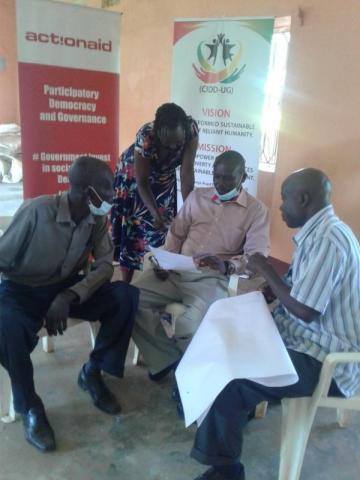
School Management Committee representatives during group work to identify key actions for improvement of girl child retention at school in Pallisa district.
The Education Act 2008 as amended stipulates that government shall provide quality and relevant education (primary and post primary) to all Ugandan children of school-going age. Universal Primary Education (UPE) is the basic education provided to all Ugandan children of school going age (6+ years). The purpose of UPE is to provide minimum necessary facilities and resources to enable all Ugandan children of school-going age to enter and remain in school compulsorily and complete the primary education cycle.
In Pallisa District education is one of the social services provided under the decentralization system through 76 government aided primary schools, a host of private schools, secondary schools and tertiary institutions. However, only the 76 government aided primary schools provide UPE in the district. By policy, its management falls under the aegis of the education and health committee of the district council while the district education office provides the technical support and supervision as a policy implementer. Over the years however, the sector has suffered from perceived challenges that include among others, school dropout and poor academic performance that have plunged the district into loss in terms of development of quality human resource and reduction of its share from the national cake in terms of UPE and USE capitation.
This stimulated interest of CIDD-UG to embark on an exercise of analyzing results of the Primary Leaving Examination (PLE) for the academic years 2018 and 2019 with four objectives.
The first objective was to determine the enrollment and magnitude of non completion of the primary education cycle in Pallisa District, secondly to determine the non completion of the primary education cycle by gender, thirdly To determine the financial loss suffered by the district from UPE and USE capitation arising from non completion of the primary school cycle and poor academic performance respectively and fourth to make recommendations to the district for improved sector performance.
The analysis was conducted and its findings were disseminated in partnership with Action Aid Local rights programme in Pallisa. The stakeholders at the dissemination included the District Education Officer, District Inspector of Schools, the secretary for education and health, the RDC, representative of Uganda National Teachers Union, selected primary Head teachers, chairpersons of School Management Committees and leaders of. As a result proposals on how to improve sector performance were collectively arrived at by the stakeholders.
Click HERE to Download Full Report .
